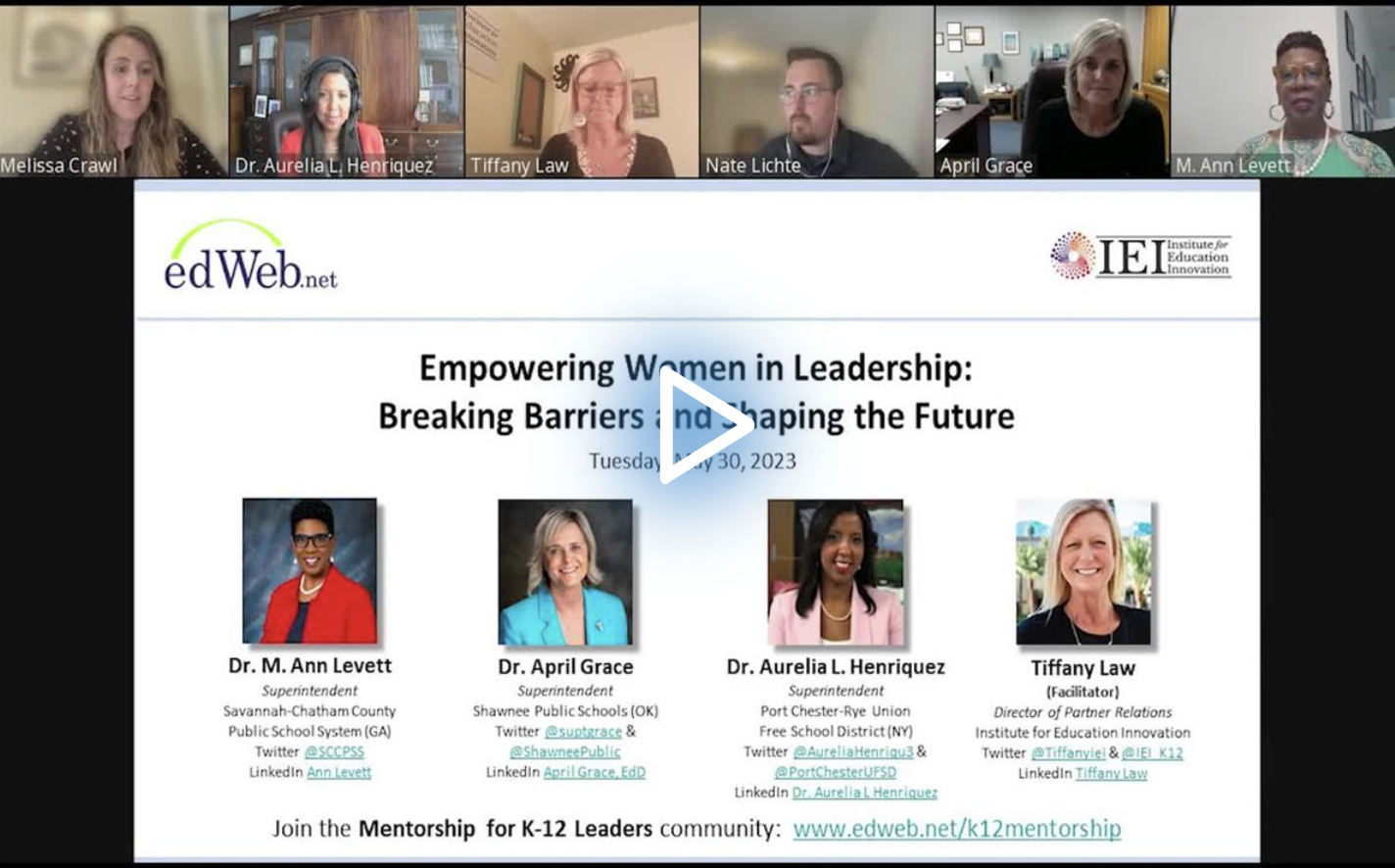Women in Leadership: Breaking Barriers and Shaping the Future
Watch the Recording Listen to the Podcast
The U.S. Department of Education recently published a report that suggests women occupy 19% of superintendent positions, but occupy 77% of teaching roles.
Given the gap in representation at the highest level, the edLeader Panel “Empowering Women in Leadership: Breaking Barriers and Shaping the Future” brought together three superintendents—Dr. M. Ann Levett, Dr. April Grace, and Dr. Aurelia L. Henriquez—to discuss how to rise to the top as women in education.
Led by moderator Tiffany Law, Director of Partner Relations at the Institute for Education Innovation, the conversation unpacked the challenges women encounter on their journeys to leadership positions. Each of the panelists shared personal experiences and strategies to overcome the barriers they faced.
The panelists candidly unveiled the pressure and expectations placed upon them—stating that oftentimes, the bar seemed higher for them than for their male colleagues. They explored what it meant to be constantly questioned if they possess the capabilities to excel in their roles, and how to prove critics wrong.
To rise above the critics, they advocated for the recognition of these challenges. They urged women to confront biases head-on, name the biases for what they are, and seek knowledge to counteract them. By embracing transparency, effectively communicating their expertise, and being armed with facts, women can shatter the misconceptions that hold them back.
Dr. Henriquez encapsulated this sentiment perfectly, stating, “People can’t argue with facts.” Additionally, Dr. Grace and Dr. Levett emphasized the importance of embracing criticism, leaning into it rather than shying away, and leveraging it as a catalyst for growth.
Imposter syndrome, a foe that often plagues women—and especially women of color—was also an important topic of discussion. The panelists offered heartfelt advice, encouraging women to adopt an attitude of lifelong learning and embrace the notion that there is always more to discover.
They emphasized the significance of forging connections with powerful women, creating a support network where transparency about mistakes is celebrated, and continuous improvement is the guiding principle.
In this journey, they acknowledged that it is crucial for women to remember that leaders don’t need to possess all the answers, but should surround themselves with diverse perspectives and individuals who bring valuable expertise to the table.
The edLeader Panel then shifted focus to how to bolster and promote women’s advancement in leadership. The panelists offered suggestions on how to create pathways for success. They passionately advocated for the creation of spaces that showcase women in leadership, showing up as role models and leading by example, and the power of sharing authentic stories to inspire future generations.
Driven by a shared purpose, the panelists stressed the responsibility of those in positions of power to clear the way for women with potential, particularly women of color, who often face even greater barriers. Making space on your team is crucial, shared Dr. Levett, and advocating for diverse opinions makes the team stronger.
Additionally, the critical role of mentorship and sponsorship emerged as an important theme in the discussion. The panelists carefully distinguished the roles of mentors and sponsors, with mentors providing guidance, support, and encouragement, while sponsors actively champion individuals by connecting them to opportunities that would otherwise remain inaccessible.
Both mentors and sponsors, they agreed, are equally as important to have at different points in your career. Additionally, they shared the importance of embracing mentorship at all levels, even when it is a direct report who ends up mentoring you.
They also highlighted the urgent need to engage men in the conversation to educate them about the value of women’s presence and contributions.
Most importantly, Dr. Levett, Dr. Grace, and Dr. Henriquez shone a light on a path forward, urging women to seek out leadership. They emphasized the power of showing up, and why it is important for women to step outside their comfort zones and seize new opportunities, even if they aren’t sure if they are qualified. It was a call to say “yes” to challenges, to proactively seek guidance, and to steadfastly believe in their own potential.
The conversation between these three superintendents was an important call to action—an invitation to acknowledge the challenges, build community, and forge a path toward women’s advancement in leadership. It was a call to women to build their self-confidence and to reach for the top.
It is clear that if more female teachers and young professionals embrace this call, it will be possible to shape a more equal future where women thrive as leaders and ignite a positive impact on the next generation of students.
Learn more about this edWeb broadcast, “Empowering Women in Leadership: Breaking Barriers and Shaping the Future,” sponsored by Institute for Education Innovation.
Watch the Recording Listen to the Podcast
Join the Community
Mentorship for K-12 Leaders is a free professional learning community that aims to connect aspiring leaders with mentors and content that helps guide, support, and provide insights into education leadership.
The Institute for Education Innovation is bridging the gaps between the individuals and organizations committed to seeing students succeed in school and life, creating a safe space for constructive problem-solving and innovative thinking.
Blog post by Laura Smulian, based on this edLeader Panel.






Comments are closed.